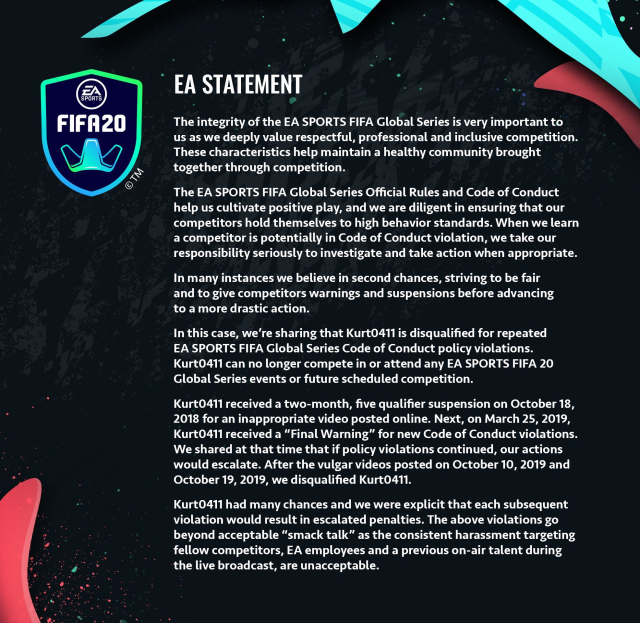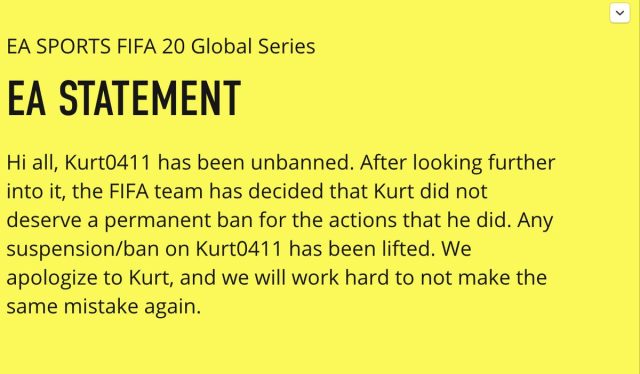Electronic Arts has banned controversial 25-year-old Maltese FIFA esports player Kurt "Kurt0411" Fenech from all EA games and services. The move is an unprecedented escalation in punishment for a player EA has been struggling to deal with publicly for well over a year.
EA says Fenech has "continued to post abusive and threatening messages and videos about EA employees and competitive players on social media and he has encouraged others to do the same. His messages have crossed a line of decency into very personal attacks and breach our Terms of Service. We will not tolerate threatening behavior."
An Important message regarding FIFA player Kurt0411. pic.twitter.com/RcHu1hMCup
— Electronic Arts (@EA) February 24, 2020
Fenech, who has been banned from EA's professional FIFA esports competitions since November, has continued to host popular FIFA streams on Twitch in a personal capacity in recent months (despite previous threats to quit the game). He wrote on Twitter Monday that "I have never said anything I shouldn’t have. This is just deeper than anyone thinks. They didn’t want me competing at events [because] they were scared I’d win them, now I’m the 2nd biggest streamer of their game and they’re scared I’ll overtake their golden boy. But when everything is said and done we’ll beat them trust me. They have money but we have numbers. Fuck [them] and everyone on their side."
"Banning me from their esports events wasn’t enough, trying to get my Twitch and YouTube channels banned wasn’t enough, they now shut down my 10 year plus [FIFA Ultimate Team] Founder account," Fenech tweeted. "No words."
How did we get here?

Fenech was banned from the EA-sponsored FIFA Global Series competition in November, following what EA calls "Code of Conduct violations... in which he threatened employees and other players." At the time, EA noted that Fenech had already been suspended from competition multiple times since late 2018 but that he continued "posting or uploading materials that we have determined are abusive, harassing, and vulgar," which led to the permanent disqualification from professional competition.
"[Fenech] had many chances and we were explicit that each subsequent violation would result in escalated penalties," EA wrote in a November statement. "The above violations go beyond acceptable 'smack talk' as the consistent harassment targeting fellow competitors, EA employees, and a previous on-air talent during the live broadcast, are unacceptable."
That mention of on-air talent likely refers to a time Fenech interrupted a livestreamed interview with top-rated FIFA streamer Edwin "Castro1021" Castro. "All of that would have been avoided if you gave me the microphone so I can speak to the people that were watching which were watching for me," Fenech said of that incident.
Fenech has a reputation for emotional rants against EA, including an infamous clip where he spit on a scarf with the EA logo in response to a bad beat.
This is the VOD that Kurt got banned for, I am all for freedom of speech but this is disgusting behaviour. How are you going to spit on the logo of a company that you want to be a professional esports athlete for. I know I am going to get stick for this but he deserves the ban. pic.twitter.com/oJmlifBFLU
— DrJarba (@JarbaFifa) November 1, 2019
In response to the competitive ban, Fenech defended his conduct, including alleged "obscene gestures towards your opponent and targeted harassment of EA staff" ("why haven't Twitch banned me" for that conduct, he asked rhetorically). That also includes a stream where he urged an opponent to "suck on my balls you son of a bitch... my only regret here is that I didn't call him more names."
Following the competitive ban, Fenech also continued a long history of publicly criticizing EA and the FIFA games for perceived gameplay deficiencies and allegedly turning a blind eye toward cheating methods. That includes generalized statements against EA employees, of whom he said in November, "the truth is none of you [FIFA developers] should still be in the job and you should be ashamed of the product you put out."
"Could you give me examples of when I have threatened your incompetent employees?" Fenech asked on Twitter Monday, in response to his publisher-wide ban.
"Truth is they don't want me competing [because] they're scared I'll say something about their broken game live at their event," Fenech continued in November. Fenech wouldn't be alone in that kind of criticism: in a recent post-match interview, pro FIFA player Tekz said that "no one enjoys playing" FIFA 20 "because this year’s game is so unrewarding, anyone can win, guys who aren’t good can win on FIFA 20."
In November, Fenech went on to call EA "a tyranny [that] doesn't like it when someone says something they don't like and holy shit I've said plenty they don't like."

In the days following Fenech's competitive ban, a number of EA staff members saw their social media accounts hacked and used to post messages from Fenech or supportive of him. "Employee safety is our first priority, so several staff have suspended or deactivated their channels," EA said in a statement at the time.
And earlier this month, Fenech's YouTube channel was hit with a number of copyright strikes on his YouTube and Twitch videos featuring FIFA Ultimate Team. "Warning to anyone that intends to call out EA on their bullshit....they will now copy-strike your content and try to get your channels deleted," Fenech said on Twitter. "This is a tyranny that will stop at nothing. I surrender."
"One thing's for sure: there's a revolution on the way," Fenech said in a November video. "You have to pick a side. And choose a side wisely. You can't come after me and do nothing about your game. Enough is enough. Karma. It's about damn time you start caring about us. We deserve justice. We deserve a damn football game."
The nuclear option
Usually, when a popular pro player or streamer breaks a game's Terms of Service, the ultimate punishment is an outright ban from playing that specific game. That was the case when Fortnite pro Jarvis Khattri used an aimbot in a livestream, for instance. In extreme situations, players and cheat-makers may face lawsuits for damaging the competitive balance of an online game.But EA's punishment of Fenech is the first high-profile case we're aware of where a pro player's conduct in one game has led to a ban from general play of all titles and services across a publisher's entire library. The closest analogue is Valve's anti-cheat system, a zero-appeals, zero-tolerance policy that restricts all access to a Steam account and its associated purchases when it detects cheating.
In a sense, Fenech's ban from all EA games isn't completely enforceable—if he decided to buy a copy of Dead Space and play it on an offline console, there's nothing EA could do to stop him. But the ban can be applied to a wide range of games that require an EA Account for online functionality or even purchase authentication. Even if Fenech was able to get around a technical ban using a new account and/or different hardware, EA could easily use its copyright control to prevent Fenech from streaming any EA games on popular video services.After months of escalating punishment, EA has seemingly pulled out the biggest piece of ammunition in its community management arsenal to stop what it sees as Fenech's breach of community standards. But given Fenech's history of outspoken comments and extreme reactions, we can't be sure that this will be the end of the story.
Listing image by EA
reader comments
317